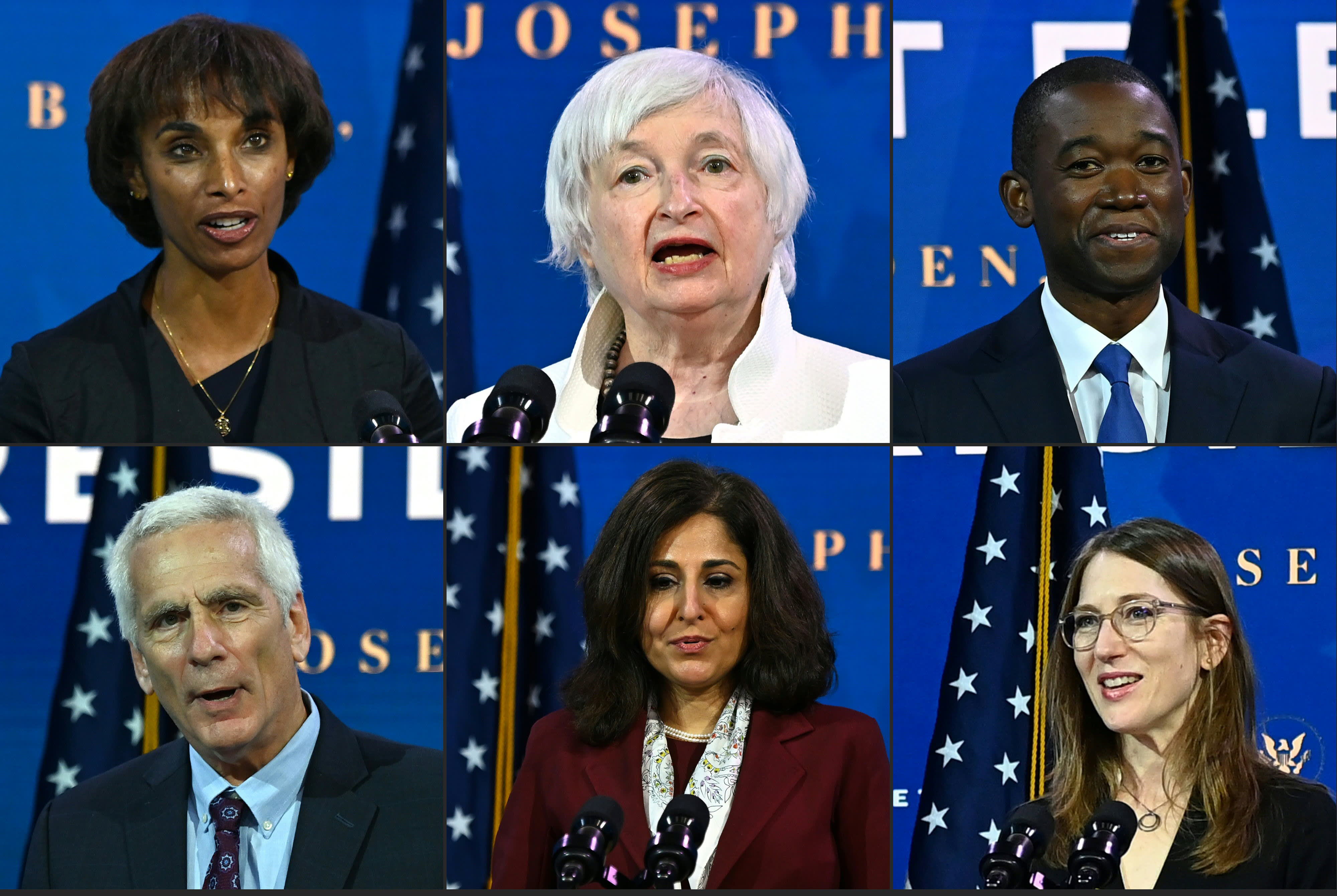US President-elect Joe Biden’s economic team at The Queen Theatre in Wilmington, Delaware, on December 1, 2020. (Top L-R) Chair of Council of Economic Advisers nominee Cecilia Rouse, Treasury secretary nominee Janet Yellen, and Deputy secretary of the Treasury nominee Adewale Wally Adeyemo. (Bottom L-R) Council of Economic Advisors nominee Jared Bernstein, Office of Management and Budget nominee Neera Tanden, Council of Economic Advisors nominee Heather Boushey.
Chandan Khanna | AFP | Getty Images
WASHINGTON — President-elect Joe Biden introduced six key members of his economic team to the nation on Tuesday. Together, they comprise a diverse group of experts whose personal histories and economic philosophies represent a sharp departure from the past four years of President Donald Trump’s administration.
“This is a family-oriented team,” Biden said during an event in Wilmington, Delaware, featuring the nominees. “This team will always be there for you and your families.”
Indeed, family was the consistent, if unexpected, theme that ran through each of the six speeches delivered by the nominees Tuesday.
Biden’s economic advisors described how their early experiences of hardship became windows through which they still view economic policy as accomplished economists.
Former Federal Reserve Chair Janet Yellen, Biden’s nominee for Treasury secretary, described how her father, a family physician, treated patients in the basement of their home in a working-class area of Brooklyn.
At night, she said, her father would talk about “what work meant to his patients, our friends and neighbors. Especially if they lost a job, the financial problems, the family problems, the health problems, the loss of dignity and self-worth.”
Yellen added: “I became an economist because I was concerned about the toll of unemployment on people, families and communities.”
Neera Tanden, a veteran Democratic policy advisor Biden tapped to lead the Office of Management and Budget, described how her single mother, an immigrant from India, relied on food stamps to feed her two daughters and Section 8 housing vouchers to pay the rent.
“I am here today thanks to my mother’s grit, but also thanks to the country that had faith in us, that invested in her humanity and in our dreams. I’m here today because of social programs, because of budgetary choices, because of a government that saw my mother’s dignity and gave her a chance,” said Tanden.
Stories like Tanden’s and Yellen’s were also striking because of how deeply they differ from the experiences and biographies of Trump’s first slate of economic advisors, announced a few days after the president’s upset victory in the 2016 election.
Composed entirely of white men, Trump’s financial advisory team was heavily weighted toward Wall Street barons and billionaires.
President Donald Trump, U.S. President Donald Trump’s national security adviser John Bolton, U.S. Treasury Secretary Steven Mnuchin attend a working dinner with Chinese President Xi Jinping after the G20 leaders summit in Buenos Aires, Argentina December 1, 2018.
Kevin Lemarque | CNBC
“I want people that made a fortune,” Trump said in late 2016, explaining his presidential hiring preferences. More than anything, however, Trump said he didn’t believe “a poor person” could be an effective economic advisor. He wanted rich people running the economy “because that’s the kind of thinking we want.”
There was none of that “kind of thinking” on display Tuesday in Wilmington. Instead, there was a focus on immigrant experiences, marginalized groups and union workers.
Adewale “Wally” Adeyemo, a former deputy director of the National Economic Council and Biden’s nominee for deputy secretary of the Treasury, recounted how his immigrant parents came to America from Nigeria.
Adeyemo described how his parents, “an elementary school principal and nurse, came to America to build a better life for me and my siblings. They taught us that we have a responsibility to serve our community and the country that gave us so many opportunities,” he said.
Cecilia Rouse, a Princeton economist and Biden’s choice to lead the Council of Economic Advisors, described how her first college economics class coincided with a steep recession in the early 1980s. “It was impossible for me to separate what we were learning from what I knew was going on in towns across the country,” she said.
Longtime Biden economic advisor Jared Bernstein, set to join the CEA, recalled being raised by a single mother who kept a photo of Franklin Delano Roosevelt on the wall.
Heather Boushey, another Biden pick to join the CEA, spoke last. She recounted how her father was laid off from his job at Boeing in the 1980s. “For the first time, I truly experienced this pain called the economy,” she said.
“I was struck by the profound power this mysterious force held over my life, my friends and my community,” said Boushey.
Biden is expected to name several more key White House positions in the coming weeks.
